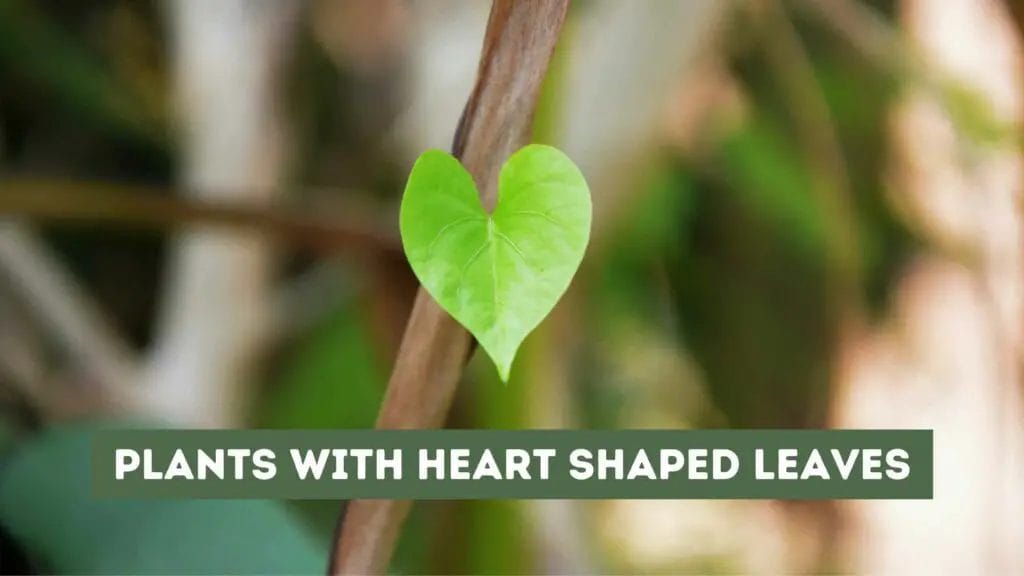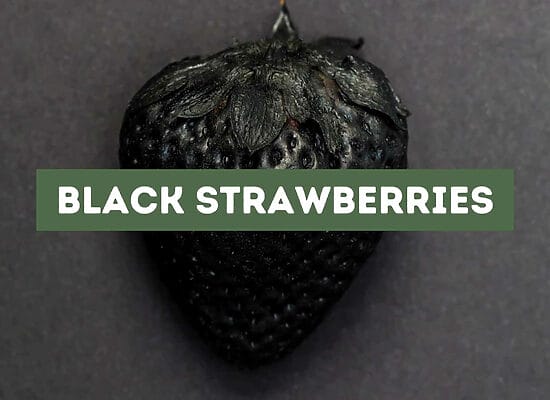
If you’re looking to add some love to your home or garden, consider these 15 plants with heart shaped leaves. Whether you’re a seasoned gardener or just starting out, these plants are easy to care for and come in a variety of shapes and sizes. From the classic philodendron to the unique Dutchman’s pipe, there is a heart-shaped plant for everyone.
Adding heart-shaped plants to your home or garden is a great way to bring some love and beauty into your space. Not only are these plants aesthetically pleasing, but they also have a variety of health benefits, such as improving air quality and reducing stress. So why not add some love to your life with these 15 plants with heart-shaped leaves?
Key takeaways:
- Variety of Heart-Shaped Plants: The article highlights 15 plants with heart-shaped leaves, such as the morning glory and heartleaf philodendron. These plants come in various shapes, sizes, and colors, making them suitable for different preferences and spaces.
- Symbolism and Meaning: Heart-shaped leaves are associated with love, affection, and friendship. They are often given as gifts on occasions like Valentine’s Day, weddings, and anniversaries.
- Aesthetic and Health Benefits: Incorporating heart-shaped plants into your home or garden not only adds beauty but also offers health benefits. These plants can improve indoor air quality and help reduce stress.
- Popular Houseplants: The article highlights popular indoor heart-shaped plants like the philodendron (including heartleaf and split-leaf varieties), cyclamen, morning glory, Brunnera, string of hearts, and anthurium. These plants have varying care requirements and unique features.
- Heart-Shaped Trees: It also mentions several trees with heart-shaped leaves, such as Silver Linden, Northern Catalpa, Eastern Redbud, Foxglove Tree, and Henry’s Lime. These trees offer ornamental value and can be a great addition to outdoor spaces.
- Growing Conditions and Care: To ensure healthy growth of heart-shaped plants, the article provides care tips including appropriate lighting, soil, watering, humidity, temperature, fertilization, and pruning techniques.
- Symbolism and Culinary Use: Beyond their decorative appeal, heart-shaped leaves hold symbolic meaning, often associated with luck and positivity. The article also lists edible plants with heart-shaped leaves, including watercress, sorrel, violets, chives, and more, showcasing their culinary uses.
Understanding Heart-Shaped Leaves
If you are looking for a plant that symbolizes love, then you might want to consider one with heart-shaped leaves. These plants are not only beautiful but also meaningful. Here are a few things you need to know about heart-shaped leaves:
- What are heart-shaped leaves? Heart-shaped leaves are leaves that resemble the shape of a heart. They are usually wider at the base and taper towards the tip. They can be found in various sizes and shades of green, red, pink, and white.
- What do heart-shaped leaves symbolize? Heart-shaped leaves are often associated with love, affection, and friendship. They are popular as gifts for Valentine’s Day, weddings, and anniversaries.
- What plants have heart-shaped leaves? There are many plants that have heart-shaped leaves, both indoor and outdoor. Some popular ones include:
- Philodendron
- Pothos
- Hoya
- Cyclamen
- English Ivy
- Caladium
- Coleus
- Morning Glory
- Redbud Tree
- How to care for plants with heart-shaped leaves? Different plants have different care requirements, but in general, plants with heart-shaped leaves prefer bright, indirect light and well-draining soil. They also benefit from occasional fertilization and pruning.
- How to use plants with heart-shaped leaves in your home? Plants with heart-shaped leaves can add a touch of romance and warmth to your home decor. You can display them in a vase, hang them in a macrame planter, or place them on a windowsill. They also make great gifts for your loved ones.
Popular Plants with Heart-Shaped Leaves
If you’re looking for plants with heart-shaped leaves, you have plenty of options to choose from. Here are some of the most popular plants with heart-shaped leaves that you might want to consider:
Philodendron
Philodendron is a popular houseplant that is known for its heart-shaped leaves and easy care. It is a great choice for beginners because it can thrive in low-light conditions and doesn’t require a lot of water. There are many different varieties of philodendron, including the heartleaf philodendron, which has small, glossy leaves, and the split-leaf philodendron, which has large, deeply lobed leaves.
Cyclamen
Cyclamen is a beautiful flowering plant that has heart-shaped leaves. It is native to the Mediterranean region and is often grown as a houseplant in cooler climates. Cyclamen blooms in the winter and has delicate, fragrant flowers in shades of pink, red, and white.
Morning Glory
Morning Glory is a climbing plant that has heart-shaped leaves and beautiful trumpet-shaped flowers. It is a popular garden plant that can be grown on trellises, fences, and walls. Morning Glory blooms in the summer and comes in a variety of colors, including blue, pink, and white.
Brunnera
Brunnera is a shade-loving perennial that has heart-shaped leaves and delicate blue flowers. It is a great choice for woodland gardens and can be grown in containers as well. Brunnera blooms in the spring and can grow up to 2 feet tall.
String of Hearts
String of Hearts is a trailing houseplant that has small, heart-shaped leaves on long, delicate stems. It is a great choice for hanging baskets and can be grown in bright, indirect light. String of Hearts is also known as Ceropegia woodii and is native to South Africa.
Anthurium
Anthurium is a tropical houseplant that has heart-shaped leaves and bright, colorful flowers. It is a great choice for adding a pop of color to your home and can be grown in bright, indirect light. Anthurium blooms in the summer and comes in a variety of colors, including red, pink, and white.
Jack Frost
Jack Frost is a variety of Brunnera that has heart-shaped leaves with silver markings. It is a great choice for adding a touch of elegance to your garden and can be grown in shade or partial shade. Jack Frost blooms in the spring and can grow up to 1 foot tall.
These are just a few of the many plants with heart-shaped leaves that you might want to consider. Whether you’re looking for a houseplant or a garden plant, there is sure to be a plant with heart-shaped leaves that will suit your needs.
Heart-Shaped Leaves in Trees
If you’re looking for trees with heart-shaped leaves, you’ll find a wide variety of options to choose from. Here are some of the most popular ones:
Silver Linden
Silver Linden is a deciduous tree that is native to Europe and western Asia. It is also known as the silver lime tree or European white lime tree. This tree is a popular ornamental tree that is grown for its attractive foliage and fragrant flowers. The heart-shaped leaves of the Silver Linden are dark green on the top and silver-green on the bottom. They can grow up to 15 cm (6 inches) long and 12 cm (5 inches) wide.
Northern Catalpa
The Northern Catalpa is a deciduous tree that is native to North America. It is also known as the Indian bean tree or cigar tree. The heart-shaped leaves of this tree are large and can grow up to 25 cm (10 inches) long and 20 cm (8 inches) wide. They are a bright green color and have a slightly wavy edge.
Eastern Redbud
The Eastern Redbud is a small deciduous tree that is native to eastern North America. It is also known as the Judas tree. The heart-shaped leaves of this tree are a bright green color and can grow up to 10 cm (4 inches) long and 12 cm (5 inches) wide. They are one of the first trees to bloom in the spring, producing clusters of pink or purple flowers on the branches before the leaves appear.
Foxglove Tree
The Foxglove Tree, also known as the Paulownia Tree, is a deciduous tree that is native to China. The heart-shaped leaves of this tree are large and can grow up to 30 cm (12 inches) long and 20 cm (8 inches) wide. They are a bright green color and have a slightly fuzzy texture. The Foxglove Tree is known for its fast growth and can reach heights of up to 12 meters (40 feet) in just a few years.
Henry’s Lime
Henry’s Lime is a deciduous tree that is native to China. It is also known as the Henry’s Lime tree or Chinese Tilia. The heart-shaped leaves of this tree are a bright green color and can grow up to 12 cm (5 inches) long and 10 cm (4 inches) wide. They have a slightly fuzzy texture and a serrated edge. The Henry’s Lime tree is known for its fragrant flowers, which bloom in the summer and attract bees and other pollinators.
These are just a few of the many trees with heart-shaped leaves that you can choose from. Whether you’re looking for a tree for shade, privacy, or just for its beauty, there is sure to be a tree with heart-shaped leaves that will meet your needs.
Heart-Shaped Leaves in Indoor Plants
If you’re looking to add a touch of love to your indoor space, consider plants with heart-shaped leaves. Not only are they visually appealing, but they also add a unique touch to your décor. Here are a few indoor plants with heart-shaped leaves that you might want to consider:
Pothos
Pothos, also known as Devil’s Ivy, is a popular indoor plant that is easy to care for and can thrive in low-light conditions. It has heart-shaped leaves that are variegated with shades of green and yellow. Pothos can grow up to 10 feet long, making it a great option for hanging baskets or training up a trellis.
Heart Fern
The Heart Fern, also known as Hemionitis Arifolia, is a small indoor plant with heart-shaped leaves that are a deep green color. It is a low-maintenance plant that can thrive in bright, indirect light, or low-light conditions. Heart Ferns prefer to be kept moist but not waterlogged.
Monstera
The Monstera, also known as the Swiss Cheese Plant, is a popular indoor plant with large, heart-shaped leaves that have unique perforations. It is a tropical plant that can grow up to 10 feet tall and prefers bright, indirect light. Monstera plants are also known for their air-purifying properties.
Hoya Kerri
Hoya Kerri, also known as Sweetheart Hoya, is a unique indoor plant with heart-shaped leaves that are thick and succulent. It produces small, star-shaped flowers that have a sweet fragrance. Hoya Kerri prefers bright, indirect light and well-draining soil.
These are just a few examples of indoor plants with heart-shaped leaves that you can add to your collection. Whether you’re a seasoned plant parent or just starting out, these plants are sure to add a touch of love to your indoor space.
Growing Conditions for Heart-Shaped Leaves Plants
When it comes to growing heart-shaped leaves plants, there are a few things you should keep in mind to ensure their healthy growth. Here are some growing conditions to consider:
- Lighting: Most heart-shaped leaves plants thrive in bright, indirect light. Avoid exposing them to direct sunlight, as it can harm their leaves. If you’re growing these plants indoors, place them near a window that receives plenty of natural light, but make sure to filter the light with a sheer curtain or blinds.
- Soil: Heart-shaped leaves plants prefer well-draining soil that is rich in organic matter. Choose a potting mix that is formulated for indoor plants, or make your own by combining equal parts of peat moss, vermiculite, and perlite.
- Watering: Keep these plants consistently damp, but not overly soaked. Water when the top inch of soil is dry to the touch, and ensure the pot has drainage holes to avoid water buildup.
- Humidity: Many heart-shaped leaf plants are native to tropical regions, so they appreciate high humidity. You can increase the humidity around your plants by placing a tray of water near them or by using a humidifier.
- Temperature: Most heart-shaped leaves plants prefer warm temperatures between 65°F and 80°F (18°C and 27°C). Avoid exposing them to drafts or sudden temperature changes.
- Fertilizer: These plants benefit from regular fertilization during the growing season. Use a balanced, water-soluble fertilizer every two weeks or as directed on the label.
Pro Tip: To encourage bushy growth and prevent leggy stems, pinch back the tips of your heart-shaped leaves plants regularly.
Heart-Shaped Leaves and Symbolism
Plants with heart-shaped leaves have long been associated with love and affection. The shape of the leaves is said to represent the heart, which is the symbol of love. These plants are often given as gifts to express love and appreciation to someone special.
In addition to their symbolism of love, heart-shaped leaves are also believed to bring good luck to the home. Many cultures believe that having plants with heart-shaped leaves in the house can bring prosperity and happiness to the family.
Some of the most popular plants with heart-shaped leaves include the Hoya Heart, String of Hearts, and the Heartleaf Philodendron. These plants are not only beautiful but also easy to care for, making them a great addition to any home.
Did you know that the Caladium plant, with its large heart-shaped leaves, was once used by Native Americans to treat snake bites? The leaves were crushed and applied to the wound to help draw out the venom.
Whether you’re looking for a way to express your love or just want to add some good luck to your home, plants with heart-shaped leaves are a great choice.
Edible Plants with Heart-Shaped Leaves
Here are some edible plants with heart-shaped leaves:
- Watercress (Nasturtium officinale) – This aquatic plant has small heart-shaped leaves with a peppery taste. It is often used in salads or as a garnish.
- Sorrel (Rumex acetosa) – The leaves of this plant are arrow-shaped with a distinct sour taste. They are often used in salads or soups.
- Lambsquarters (Chenopodium album) – Also known as wild spinach, this plant has heart-shaped leaves with a slightly sweet and nutty flavor. It can be used in salads, soups, or sautéed as a side dish.
- Violets (Viola spp.) – These delicate flowers have heart-shaped leaves with a mild, sweet flavor. They can be used in salads, as a garnish, or candied for a sweet treat.
- Chives (Allium schoenoprasum) – The leaves of this herb are thin and grass-like, but when they are young they have a heart-shaped base. They have a mild onion flavor and are often used as a garnish or in soups and salads.
- Borage (Borago officinalis) – This herb has heart-shaped leaves with a cucumber-like flavor. The leaves and flowers are often used in salads or as a garnish.
- Linden (Tilia spp.) – The heart-shaped leaves of this tree can be used to make a tea with a sweet, floral flavor.
- Cranberry (Vaccinium spp.) – The leaves of this plant are small and heart-shaped with a sour taste. They can be used to make tea or added to salads.
- Wild garlic (Allium vineale) – This plant has thin, grass-like leaves with a heart-shaped base and a strong garlic flavor. It can be used in soups, stews, or as a seasoning.
- Red clover (Trifolium pratense) – The leaves of this plant are heart-shaped and have a slightly sweet taste. They can be used in salads or as a tea.
- Wood sorrel (Oxalis spp.) – This plant has heart-shaped leaves with a sour taste. It can be used in salads or as a garnish.
- Garlic mustard (Alliaria petiolata) – This plant has heart-shaped leaves with a spicy garlic flavor. It can be used in salads, soups, or as a seasoning.
- Plantain (Plantago spp.) – The leaves of this plant are heart-shaped and have a slightly bitter taste. They can be used in salads or as a cooked green.
- Dandelion (Taraxacum officinale) – The leaves of this plant are deeply lobed and have a bitter taste. They can be used in salads or as a cooked green.
- Purslane (Portulaca oleracea) – This plant has small, succulent leaves with a slightly sour taste. It can be used in salads or as a cooked green.
FAQ: Plants with Heart Shaped Leaves
What are some plants with heart-shaped leaves?
There are many plants with heart-shaped leaves, including the Heartleaf Philodendron, Caladium, Pothos, Cyclamen, and Bleeding Heart. These plants are popular for their attractive foliage and are often used as indoor or outdoor decorative plants.
Can you name a deciduous tree with heart-shaped leaves?
Yes, the Eastern Redbud (Cercis canadensis) is a deciduous tree with heart-shaped leaves. It is a popular ornamental tree that produces pink or purple flowers in the spring.
Which indoor plants have heart-shaped leaves?
Some popular indoor plants with heart-shaped leaves include the Heartleaf Philodendron, Pothos, and Arrowhead Plant. These plants are easy to care for and can be grown in a variety of conditions.
What is the scientific name for plants with heart-shaped leaves?
Plants with heart-shaped leaves belong to various families and genera. However, some common scientific names for plants with heart-shaped leaves include Philodendron hederaceum, Caladium bicolor, and Dicentra spectabilis.
What is an example of a small green plant with heart-shaped leaves?
The String of Hearts (Ceropegia woodii) is a small green plant with heart-shaped leaves. It is a trailing plant that is often grown as a hanging plant and is popular for its delicate appearance.
What perennial plants have heart-shaped leaves?
Some common perennial plants with heart-shaped leaves include the Bleeding Heart (Dicentra spectabilis), Hosta, and Lungwort (Pulmonaria). These plants are often grown for their attractive foliage and can add color and texture to any garden.












